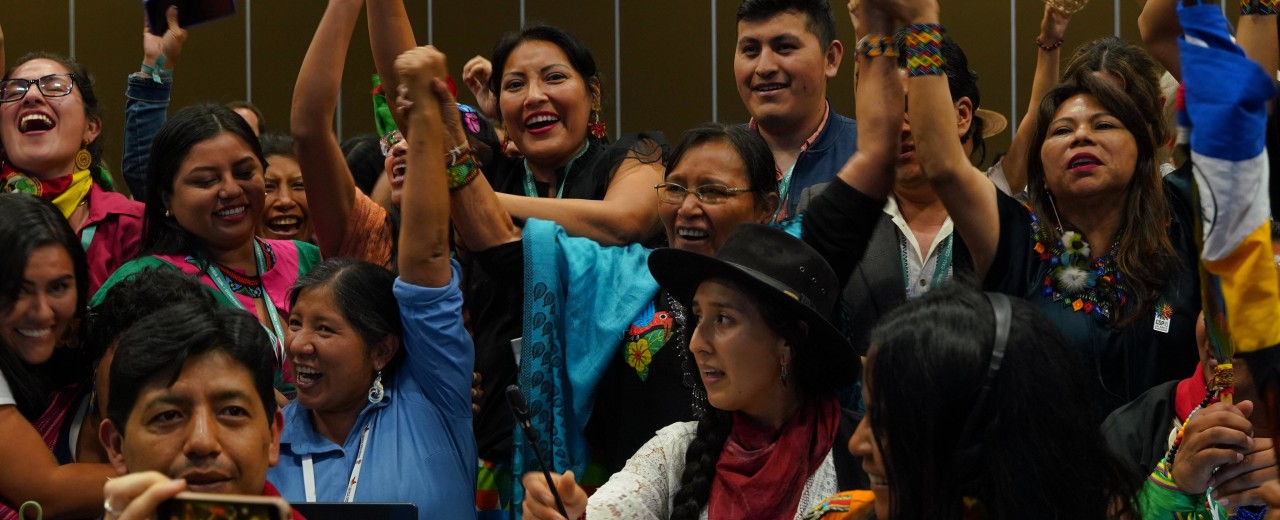News from 2024-11-07 / KfW Development Bank
Progress at the World Summit on Nature - even without a formal end

The COP 16 on biodiversity in Cali was suspended on 2 November after a night of negotiations without a formal end, as many delegates had already had to leave and the necessary two-thirds quorum could no longer be achieved. Nevertheless, KfW believes that important progress was made in Cali. Alongside climate and energy, the protection of biodiversity is one of the most important sectors for KfW Entwicklungsbank and one of the objectives of KfW Bankengruppe as a whole. In Cali, KfW was broadly represented with its domestic and international promotional areas, including at the level of the Group's Executive Board.
COP 16 was the first after the historically important adoption of the Global Biodiversity Framework (GBF) in Montreal in 2022. At that time, 23 specific goals were agreed, one of which was to protect 30 per cent of the Earth's surface by 2030. The negotiations in Cali were intended to specify and further develop the GBF through individual resolutions, including on the monitoring framework, the role of indigenous peoples and local communities (IP&LC) and the mechanism for international biodiversity financing.
The negotiations stalled in particular with regard to the discussion on monitoring, the financing mechanism and the question of who would provide the funds totalling USD 20 billion per year. The countries of the Global South insist on having their own fund, as they believe that the existing instruments are dominated by the North and that they do not have access to the financial resources. No agreement could be reached on this key point.
Successful individual resolutions
There have been decisions in other areas, such as a new fund to which companies that utilise genetic information from plants and animals in the development of products (e.g. in the medical, food or cosmetics sectors) are to contribute. Companies are to voluntarily pay into this ‘Cali DSI (Digital Sequences Information) Fund’ to equalise benefits for the countries from which the genetic information originates.
The role of indigenous peoples and local communities has also been strengthened: in future, they will be represented in a separate committee of the GBF. On behalf of the BMZ, KfW is providing EUR 10 million for the Legacy Landscapes Fund (LLF), which presented its own financing window for the direct promotion of IP&LCs in Cali.
KfW also presented a new initiative to strengthen natural CO2 reservoirs - the WALD initiative (Global Alliance for Landscape-based Decarbonisation). One of the international parts of the WALD initiative, the Innovation Facility, was launched in Cali. It promotes innovative approaches for CO2 sinks.
Finally, KfW presented the ‘Integrated Habitat Conservation Programme’ (ITHCP) to save the tiger in six Asian countries. Together with IUCN and others, all those involved drew a positive balance after ten years. The tiger populations in the project areas have increased by 40 per cent and their population appears to be secure for the time being.
Major importance of the economy
The COP emphasised the importance of biodiversity for the economy and the financial sector. More than half of global economic output is dependent on nature. At the same time, overexploitation through economic activities contributes significantly to biodiversity loss - which in turn leads to increased risks for the economy. Companies and banks have a twofold task: on the one hand, to correctly recognise and reduce the negative effects of their activities and, on the other, to make a positive contribution to the protection and restoration of biodiversity in the future. The decision by the COP parties to not only strive to protect species through protected areas, but also to anchor biodiversity as an important aspect in other fields of action - not least in climate protection - was important in this regard KfW is also pursuing this goal in its work on the upcoming group-wide Biodiversity Roadmap.
Positive impact of the COP
Even though the COP was suspended in the end, it had a positive impact overall. This was not least due to the atmosphere; it was a ‘people's COP’: the official negotiation area - the ‘Blue Zone’ - also set a record for a biodiversity COP with around 23,000 accredited participants. And Colombia, one of the most biodiverse countries in the world, was the perfect host.
KfW will continue to play an active role in seeking and implementing solutions together with its partners. Germany is the largest bilateral financier for biodiversity conservation. With its presence on site, including Board Member Christiane Laibach, it sent out a strong signal that biodiversity and climate are key issues for the international economy, the banking sector - and for KfW.
A success story that shows: international cooperation in nature conservation pays off | KfW Stories

Share page
To share the content of this page with your network, click on one of the icons below.
Note on data protection: When you share content, your personal data is transferred to the selected network.
Data protection
Alternatively, you can also copy the short link: https://www.kfw-entwicklungsbank.de/s/enzBWrMC.DKQA
Copy link Link copied